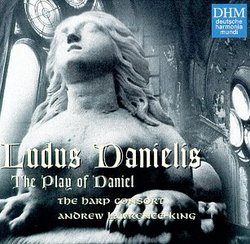Much better than I thought it would be!
10/30/2001
(5 out of 5 stars)
"I bought this CD because I'm something of a completist for early music. (From chant on up. That's early enough.) I had heard about this piece for quite some time, so naturally I picked it up, not knowing what to expect. It sounded a little dry, "The Play of Daniel." But listen here: it isn't at all. In fact, it's one of my most-favored CDs from the early days. It's alive! It speaks to me! You never know with early music CDs; they're usually a hit-or-miss affair; you like the tenor but not the alto, you like the instrumental tracks more than the singing, whatever. Here I pretty much like every track. I can't wait to listen to this one by a roaring fire at night on my next camping trip. So: full recommendation. Now, on to Perotin."
It is from the 13th century and it is French
Jacques COULARDEAU | OLLIERGUES France | 07/28/2002
(5 out of 5 stars)
"This church opera is essential because it changes all we know or all we thought we knew about the opera. First the manuscript is dated from 1230 and we can think it probably was performed for the first time at the end of the 12th century. Second it was created by the young clerics of the Beauvais cathedral in France. Third it is a real opera telling us the story of the exiled Daniel in Babylon who is thrown into the lions' pit and survives due to the intervention of God himself through his angels. It is the story of Balthazar, the king who uses jewish vases for an orgy or a banquet and is doomed to fall by God himself. It is the story of Daniel as a seer who can read the messages of God and reveal the fate Balthazar is going to be the victim of. It is the story of Darius who acknowledges Daniel's power and eventually Daniel's God. It is the story of some courtiers who plot Daniel's ruin in order to save and strengthen their power. And the whole opera uses the theme we normally find in a Mass od Fools or Mass of Asses by transforming Darius into an ass when he is manipulated into sending Daniel to the lions'pit. The recording of this opera by Andrew Lawrence-King is great because he really plays the game of an opera that is tragic, dramatic, funny too and he follows the indications he has about the music to make it as varied as possible shifting from a very elaborate and even learned music to popular dances and percussions. It is one of those discoveries that become a new landmark in a whole world of beliefs and universally accepted truths. We have to reconsider completely our knowledge about the history of the opera..."


 Track Listings (28) - Disc #1
Track Listings (28) - Disc #1